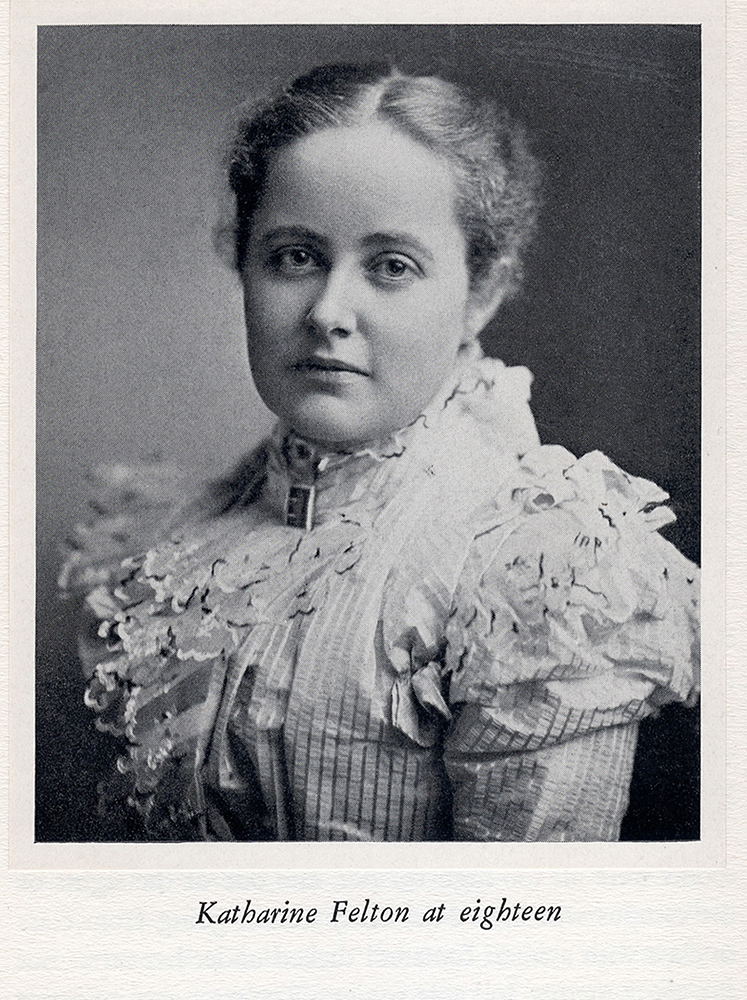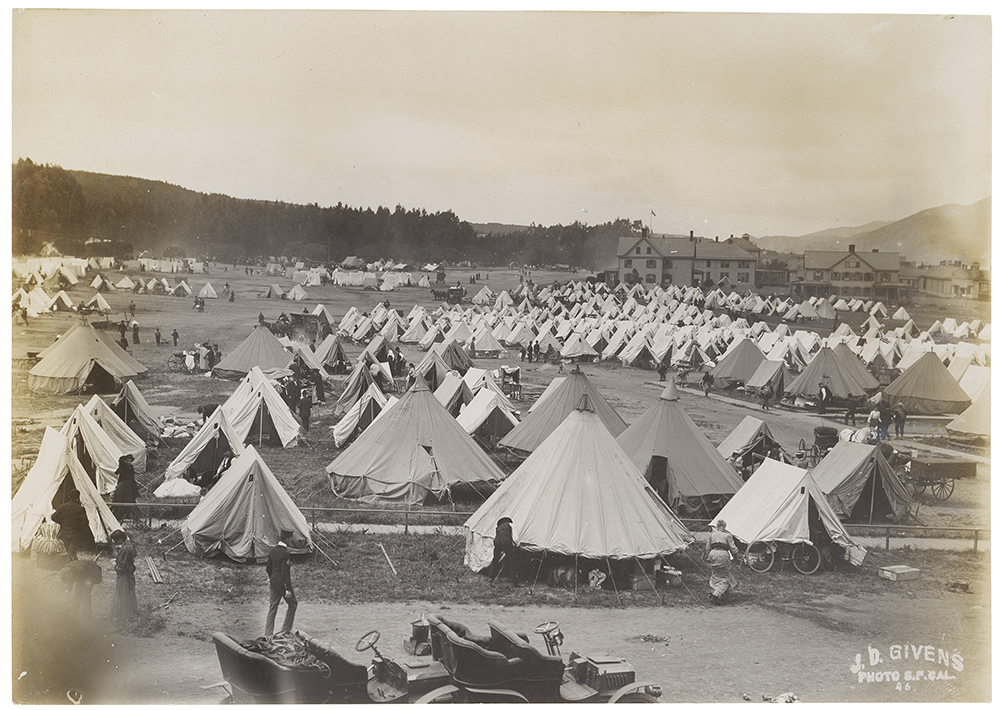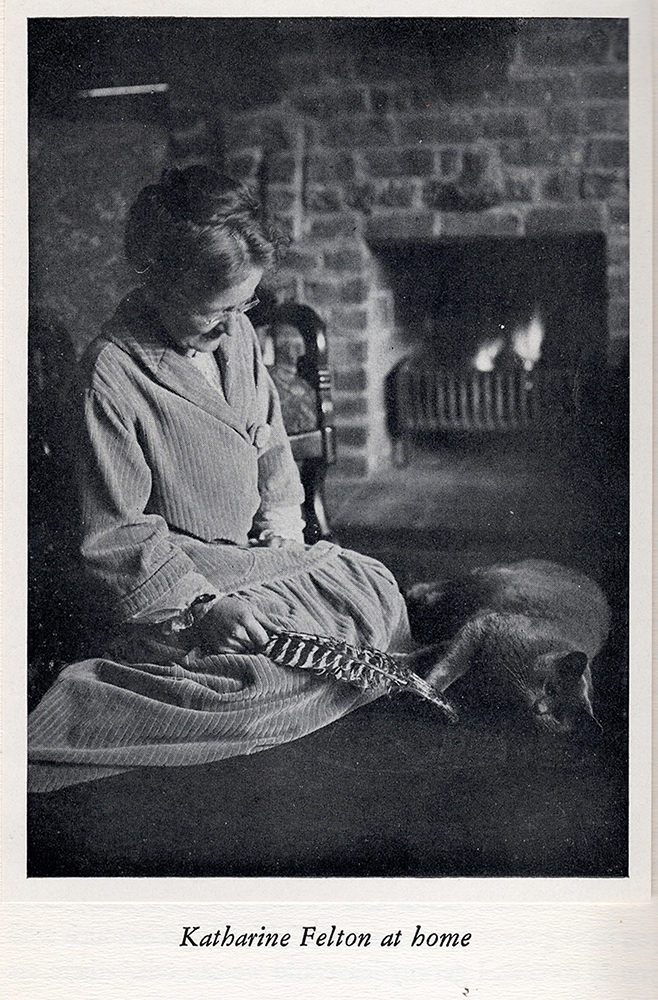In this month of July, we celebrate the birthday of Dr. Katharine (Kitty) Felton, the maverick executive director of the agency named in tribute to her, Felton Institute.
Kitty Felton was born on July 7, 1873, in Oakland, California, to a prominent Bay Area family. Her father, John Brooks Felton, was a judge and former mayor of Oakland. The city of Felton, California, near Santa Cruz, is named for Kitty’s father.
Kitty started life with all the economic and social advantages, but she worked hard for her community in a myriad of socially responsible and selfless ways. In San Francisco, she was fondly known as the “Conscience of the City” because of her dedication to social work.

Standing barely five feet tall, Kitty Felton is described as a personality larger than life: brave, brilliant, and dynamic. A famous anecdote about young Katharine Felton recounts that she initially refused to accept the gold medal awarded to her for graduating with the highest honors from the University of California Berkeley in 1895. Twenty years later, Kitty suddenly remembered the medal and asked if she might reclaim it, since her beloved agency needed funds. That medal contained gold worth about $100.
By experience and training, Kitty Felton was a social worker. But her genius and accomplishments transcended her profession – trailblazing and innovating social work, with many of her innovations still used as a standard practice today.
At the young age of 28, Felton was appointed director of Associated Charities (now known as Felton Institute). It is difficult to list all of her career accomplishments, but here are some highlights:
- Innovations to the foster parenting system result in the lowest infant mortality of any city of its’ size in the world.
- Creation of the State Board of Charities and Corrections, the forerunner of the State Department of Social Welfare.
- Formation of the very first employment agency in the U.S.
- Development of mental health counseling to deal with those who are traumatized.
- Changes in the way funds are used, combining private and public resources so that widowed and single mothers could remain at home with their children.
- Drafts of nearly all of the early legislation covering welfare and relief in the State of California.
Kitty Felton’s embodied values remain in the foundation of Felton Institute today.
“People are so brave. It has always seemed to me that the human race, by and large, is more valiant than we have any right to expect.” – Kitty Felton, 1939
Historian Dan Kelly shares some of the highlights of Kitty Felton’s impact in this interview from Felton Institute’s 125th Anniversary Celebration back in 2014:

Kitty Felton was anti-racist.
In 1906, in the days after the devastating earthquake, Kitty Felton signed and sent a telegram, along with other social welfare leaders, to President Theodore Roosevelt, urging him to furnish relief to the Chinese community, without regard to race or nationality.
The telegram, dated April 24, 1906, reads:
“All reports that the people of the administration or the relief committee of San Francisco are making any distinction between relieving, supporting or protecting the Chinese, and any other people differing in race or color, are totally false and unfounded. The committees and even the homeless people themselves are treating the Chinese and all other unfortunates with the consideration and kindness worthy of our civilization and our country. The people of San Francisco are striving with all the means in their power and with all their heart to relieve their destitute, care for their sick and helpless, and uplift their stricken, in accordance with the dictate of humanity and in a manner worthy of Americans, irrespective of race, creed or color, in the common brotherhood of man.”
Kitty Felton was a Fierce Woman Leader.
Kitty Felton was one of two female members of the Committee of Fifty. Mayor Eugene Schmitz assembled the group during the 1906 San Francisco Earthquake. In the crucible of the disaster relief following the earthquake, Kitty Felton became the head of the social service efforts to restore the life of the people of the city and developed innovative solutions that are common practice today.
Kitty Felton was a Champion for Refugees.

Survivors of the 1906 Earthquake slept in tents in city parks and at the Presidio. Kitty was responsible for emptying the refugee camps and finding placements for the dispossessed, all of which she accomplished within one year. These innovations became known as the “San Francisco Model” by 1907.
In its 131st year, Felton Institute still embodies the spirit of its namesake. In Kitty’s later years, her life was one long passionate campaign to improve health care, education, and psychiatric counseling for all children, regardless of ability. Kitty Felton was a woman ahead of her time. She advocated, lobbied, fundraised, and provided hands-on care to some of the most vulnerable members of society.
Felton Institute is immensely proud of Kitty’s legacy of charity and advocacy.

About Felton Institute: Founded in 1889, Felton Institute responds to human needs by providing cutting edge, evidence-based mental health and social services that transform lives. Felton Institute is a tax-exempt organization registered 501(c)(3) nonprofit under EIN 94-1156530.
Offering more than 50 acclaimed and honored programs that address homelessness, mental health, prenatal, adolescent, adult and senior needs, Felton Institute provides services in San Francisco, Alameda, San Mateo, Marin, and Monterey counties.
Felton is named for its social services pioneer and executive director Dr. Katharine “Kitty” Felton who was called the ”conscience of San Francisco” and was committed to ensuring that children and families in crisis have access to social services and resources in order to help them build upon their inherent strengths and develop self-sufficiency. www.felton.org
